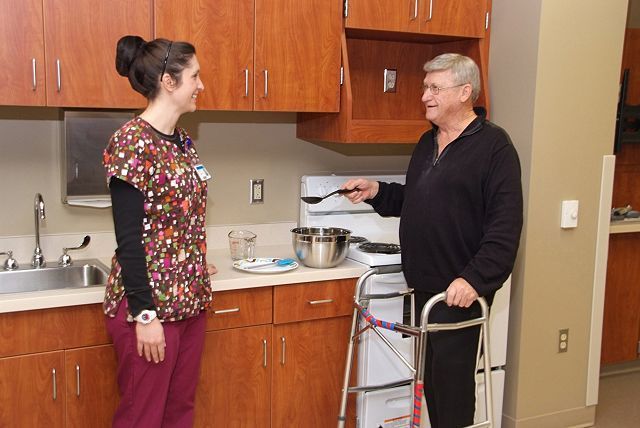Wooster Community Hospital unveils new Transitional Care Unit
Wooster Community Hospital marked another milestone this month with the opening of their new Transitional Care Unit (TCU). This is a completely new service that the hospital is providing, said Dave Rhoad, WCH marketing and public relations manager. Thanks to this addition, patients who no longer need acute hospital care but still need skilled nursing, rehabilitation or other supportive care will now have the option to stay at the hospital for a few days or weeks.
The TCU specializes in care following an acute event such as pneumonia, hip or knee replacement, congestive heart failure or stroke. Patients who undergo a procedure in another hospital may be transferred to Wooster for transitional care as well.
With their home health care and outpatient rehab programs already in place, WCH can now provide a seamless transition from hospital to home. Whats nice is that it is all within the same organization, and you are working with people who have been in touch with your care all along, said Rhoad. We really think theres value in that.
The TCU admitted its first two residents in early January and will become fully operational once the Ohio Dept. of Health completes its survey.
Wooster Community Hospital is branching out in a fresh direction this year with the addition of their spacious new Transitional Care Unit (TCU). The new unit will allow patients, who have been hospitalized for acute events such as joint replacements, pneumonia, COPD, stroke or congestive heart failure, to spend additional days or weeks recuperating in the safe and supportive environment of the hospital.
Dr. Paul Nielsen, interim medical director, said the TCU creates a place for the in-betweeners--people who no longer need acute care but are not yet well enough to return home. It provides the benefit of all the resources of the hospital during that time.
In the past, those in-betweeners had to either transfer to a nursing facility or risk a relapse by returning home before they were ready.
Studies support that whenever you can provide this type of care, outcomes improve, noted Dave Maletich, Transitional Care Unit manager. Formerly executive director of the Apostolic Christian Home in Rittman, Maletich brought 22 years of experience in the nursing home industry when he came on board a year ago. The TCUs multidisciplinary approach integrates rehabilitation nursing, physical, occupational and speech therapy, social work and dietetics under Nielsens supervision. The goal is to make sure the physical, psychological and social needs of the resident are met, Maletich said.
The Transitional Care Unit is located on the hospitals second floor, previously home to endoscopy and pediatrics. The area was completely gutted and rebuilt to house the units 22 private rooms, rehab room, dining room and lounge.
The new space is light and airy, with cheery blue and green walls and large windows. Wide hallways and an open floor plan make it feel spacious. A comfortable lounge provides a place for residents and families to gather to play games, read, watch TV or grab a cup of coffee together as they visit.
Each private room also contains a private bath. Nurses wheel wireless computer carts into the rooms for charting and medications are stored in a locked wall unit. This allows them to spend more time in the room and better assess the residents needs. One double room is available should a couple end up in the TCU together.
The unit employs a full-time physical therapist and assistant as well as a full-time occupational therapist and assistant and part-time speech therapist. Its spacious rehab room contains exercise machines and other physical therapy equipment, including a surprising but increasingly popular therapy toola Wii game system. A sink, tub, refrigerator and washing machine help residents practice the activities of daily living in occupational therapy.
Diane Tirakis, activity coordinator, plans daily therapeutic and purpose-based activities to help TCU residents with motor skills and provide sensory and intellectual stimulation. In addition, she said, the activities are just plain fun. Scheduled activities include cooking groups, games, crafts and speaker events. Our goal is to prepare our residents to go home and be successful and independent.
Rhoad said hospital-based skilled nursing and rehabilitation is another new service the hospital is providing to the area. Its good for the community – thats why were doing it. We think it will be very successful, he said.
The forward-thinking management here at the hospital is always asking what we can provide that will benefit the community, added Maletich. Im glad to be a part of that.
Medicare and most insurance will cover a stay in the TCU if needed. For more information about Transitional Care at Wooster Community Hospital, visit www.woosterhospital.org or call 330-263-8421.
This article is underwritten by Wooster Community Hospital.

